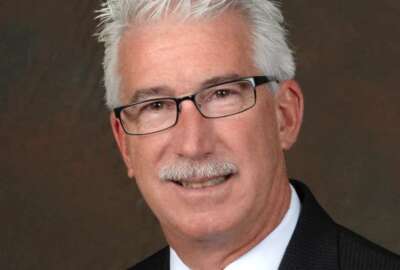
How Eric Boyette ascended ranks from DMV to North Carolina’s CIO
North Carolina Chief Information Officer Eric Boyette rose through the ranks over 20 years of state service. He joined host John Thomas Flynn on Ask the CIO: SLED...
Many aspiring state chief information officers have navigated some tortuous paths to become state IT bosses but North Carolina’s Eric Boyette’s route was decidedly unusual.
Sure, there have been state CIOs who also held the position at the department of motor vehicles. In fact, one of my successors in the Commonwealth of Massachusetts, Dave Lewis, became the Bay State CIO in the early years of this century. However, Boyette was not only North Carolina’s DMV CIO — he was the director as well.
Making an impression on the governor
Most of us wince at a trip to the DMV comparable to a visit to the dentist. It has long long been the government agency we love to hate.

“I’ve talked to some of my peers and it’s funny because when a lot of people think of [the] DMV, it’s not very favorable for the citizens and our customers,” Boyette confirmed on Ask the CIO: SLED.
Consequently, such animosity on occasion triggers severe career related repercussions, as evidenced by the recent forced retirement of California’s motor vehicle director. Long lines statewide caused the initial flap, but the coup de grâce was more than slow queues — it was the subsequent revelation that the DMV computer system mishandled about 23,000 voter registrations.
Under a new, updated motor-voter system, California residents were allowed to register to vote during a routine driver license or ID card transaction. Adding the proverbial insult to injury, more than 1,000 people, including some who were not US citizens, were incorrectly registered to vote.
Boyette averted any such debacle during his DMV administration and his performance there actually contributed to his appointment as secretary of North Carolina’s Department of Information Technology and state CIO by Gov. Roy Cooper in 2017. With more than 20-plus years in state government, Boyette truly came up through the ranks.
While he had no previous relationship with the governor, he did have support from industry and members of the legislature, and attracted the attention of Cooper’s transition team. This eventually led to a discussion with the governor about serving in his administration.
“I’ll be honest with you, it took me some time to really say that I’d accept,” Boyette said. “But the governor is such a great man and we talked about belief in where we were, and I wanted to make sure his beliefs and my beliefs were the same about what we needed for information technology and cyber security in our state. And we were dead on. So I was very thrilled to get the opportunity.”
Being in a cabinet-level position in the governor’s administration makes his job significantly easier.
Related Stories

Nebraska CIO brings private sector skills to state government

DC acting CTO prepares way for permanent appointee
Optimizing N.C.’s IT infrastructure
North Carolina is consolidating or optimizing its IT resources, infrastructure and staff into an enterprise IT model. Boyette’s department has a budget of almost $500 million and a staff that has grown from about 600 prior to current optimization, to about 2,500 today, and should be close to 3,000 once completed.
“We’re calling it optimization because what we’re doing for the state of North Carolina, we’re optimizing all of our IT staff into one agency,” he said. “So if you look at your transportation, your public safety, your health and human services, we’re creating an IT agency with those skill sets within one organization.”
His organization has both policy and operational authority, and he agreed that such authority is crucial for creating an environment conducive to a state CIO’s success.
“That was one of the things I talked about with the governor, what his vision looked like. And we were agreeable that it needed to stay the way it was. So it was great conversation,” Boyette said. “You’re right, you have to have leadership and the governor obviously is the leader and you have to have that partnership as well.”
Boyette was very specific about the theme of North Carolina’s “optimization.” He said it wasn’t a power grab like had been considered in the past.
“We’re taking all the technologists from the agencies and we’re creating a new agency. We’re learning from all the agencies and we’re taking the best practices from those who are successful and that’s what we’re using as the model for everybody,” he said. “So it’s less of a takeover and more of a partnership.”
That’s a word that Boyette said is emblematic of his management approach — partnership between the vendor community, one’s peers at the cabinet level and the General Assembly. Otherwise, he said, one cannot be successful.
What’s ahead for N.C.’s 2019 IT
Boyette articulated an aggressive plan for new state IT initiatives this year. The first is to replace the state’s legacy identity management.
“We have an RFP on the street that we’re working through the process, it’s one of our biggest procurements,” Boyette said.
The department also has an internal chat bot project which, once deployed for employees, will be expanded for citizen services. Broadband is another priority that Boyette said he and Cooper have talked about repeatedly.
Latest Technology News
Also on Boyette’s list were digital libraries where people could check out digital devices, cybersecurity partnerships with local governments, Next Generation 911 and expanded health information exchange. He also said that North Carolina brought in a consultant recently to help develop the state’s strategy as a cloud service broker for customer departments.
In closing, Boyette revealed that North Carolina is putting the finishing touches on their bi-annual IT strategic plan. “You should see one hopefully within a couple of weeks. We just finalize the draft on the end of January so it shouldn’t be long.”
But a state CIO’s life is not all bits and bytes. Boyette has been a commissioner on the local fire department board near his residence in Kenly, North Carolina, for years. So what does that have to do with being a state CIO?
“I’ll tell you that it really helps you with negotiating,” he said. “The board for North Carolina is actually housed underneath the state CIO here. That was an advantage for me.”
Copyright © 2025 Federal News Network. All rights reserved. This website is not intended for users located within the European Economic Area.







